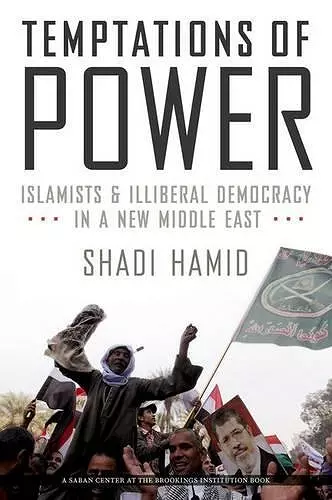Temptations of Power
Islamists and Illiberal Democracy in a New Middle East
Format:Hardback
Publisher:Oxford University Press Inc
Published:22nd May '14
Currently unavailable, and unfortunately no date known when it will be back

In 1989, Francis Fukuyama famously declared that we had reached "the end of history," and that liberal democracy would be the reigning ideology from now on. But Fukuyama failed to reckon with the idea of illiberal democracy. What if majorities, working through the democratic process, decide they would rather not accept gender equality and other human rights norms that Western democracies take for granted? Nowhere have such considerations become more relevant than in the Middle East, where the Arab uprisings of 2011 swept the Muslim Brotherhood and other Islamist parties into power. Since then, one question has been on everyone's mind: what do Islamists really want? In Temptations of Power, noted Brookings scholar Shadi Hamid draws on hundreds of interviews with Islamist leaders and rank-and-file activists to offer an in-depth look at the past, present, and future of Islamist parties across the Arab world. The oldest and most influential of these groups, the Muslim Brotherhood, initially dismissed democracy as a foreign import, but eventually chose to participate in Egyptian and Jordanian party politics in the 1980s. These political openings proved short-lived. As repression intensified, though, Islamist parties did not -- as one may have expected -- turn to radicalism. Rather, they embraced the tenets of democratic life, putting aside their dreams of an Islamic state, striking alliances with secular parties, and reaching out to Western audiences for the first time. When the 2011 revolutions took place, Islamists found themselves in an enviable position, but one they were unprepared for. Up until then, the prospect of power had seemed too remote. But, now, freed from repression and with the political arena wide open, they found themselves with an unprecedented opportunity to put their ideas into practice across the region. Groups like the Brotherhood combine the features of political parties and religious movements. However pragmatic they may be, their ultimate goal remains the Islamization of society and the state. When the electorate they represent is conservative as well, they can push their own form of illiberal democracy while insisting they are carrying out the popular will. This can lead to overreach and, at times, significant backlash, as the tragic events in Egypt following the military takeover demonstrated. While the coup and the subsequent crackdown were a devastating...
An Egyptian colleague of mine recently suggested that Hamid, who has emerged as a prominent commentator on the Muslim Brotherhood in recent years, had been duped by the organization. My colleague should read Hamids book; so should others. Many observers have explored the question of whether Islamist moderation is tactical or sincere. Hamids answer is clear: it is tactical. Hamid has extensively researched the Brotherhoods branches in Egypt, Jordan, and Tunisia. * John Waterbury, Book of the year 2014, Foreign Affairs *
An important and fresh contribution to our understanding of political Islam, Temptations of Power offers an insider and intimate perspective on Islamic movements and the rationale behind their leadership and survival. Drawing from many interviews with Islamists in the Middle East, the book uncovers aspects of political Islam that can sound counterintuitive to general audiences. * Reza Akhlaghi, Book of the year 2014, Foreign Policy Association *
ISBN: 9780199314058
Dimensions: 236mm x 157mm x 28mm
Weight: 522g
280 pages